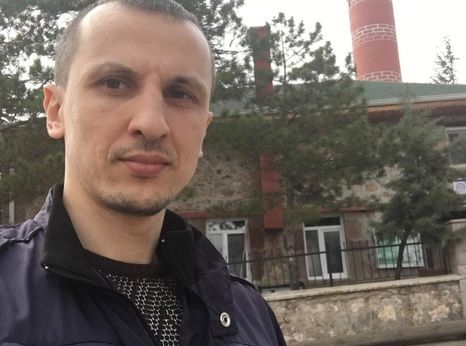Detained rights activist must be released

People who have opposed the Crimean Peninsula's occupation and illegal annexation by Russia and human rights violations committed there since 2014 have faced persecution, including harassment, intimidation, prosecution under trumped-up charges and enforced disappearances. International human rights monitors do not have access to Crimea and independent media are either banned or forced to shut down.
Server Mustafayev is the founder and coordinator of the grassroots movement Crimean Solidarity in Russian-occupied Crimea. The movement was created on 9 April 2016 in response to political and religious persecution of Crimean Tatars and others by the Russian authorities. The movement brings together activists, lawyers and relatives of those who have been arrested and prosecuted, to ensure they can access legal aid, financial, medical and other vital support. In the absence of free media and given persecution of all dissenting voices in Crimea following its illegal annexation by Russia in 2014, the movement also seeks to raise awareness about ongoing human rights violations in Crimea.
On 21 May 2018, Server Mustafayev's house in Bakhchisaray, a town in southern Crimea, was searched by members of the Federal Security Service (FSB). He was then taken to the local FSB headquarters in Simferopol, the capital of Crimea, and charged with "membership of a terrorist organisation" (part 2 of Article 205.5 of the Russian Criminal Code) over his alleged links to Hizb ut-Tahrir, an international Islamic organisation that is banned as "terrorist" in Russia but is legal in Ukraine. Its members have not engaged in nor advocated violence in Crimea, either before or after the peninsula’s occupation in 2014. Alleged membership of Hizb ut-Tahrir has been used by the Russian authorities in occupied Crimea as a pretext for prosecution of dissenting voices, including human rights defender Emir-Usein Kuku.
On 22 May, a court in Simferopol ordered Server Mustafayev's pre-trial detention, which has since been prolonged repeatedly. Server Mustafayev's lawyer told Amnesty International that the only evidence against him is an audio-recording of his brief remarks including a question he asked during a religious lecture held at a mosque in Bakhchisaray on 2 December 2016. He asked if one can love a person "in general" yet hate the same person for a particular action; and then he elaborated on his point, without stating anything that could be seen as inciting hatred or violence. The lecture was attended by about 70 people and had been openly advertised. Yet the investigation concluded that Server Mustafayev had taken part in a secret Hizb ut-Tahrir gathering. On 22 February, Server Mustafayev was additionally charged with "conspiring to seize power by violent means" (Article 278 of the Russian Criminal Code). The investigation has failed to provide any evidence of him having committed any internationally recognisable crime. Server Mustafayev denies he was involved in any "terrorist" activities. The charges against him carry up to 25 years in prison.
Seven other men were charged with terrorism-related charges as part of this case. Marlen Asanov, Timur Ibragimov, Server Zekeryayev, Seyran Saliyev, Ernest Ametov and Memet Belyalov were detained on 11 October 2017. Edem Smailov was detained on 21 May 2018. All of them are charged on the basis of audio recordings of their attendance at the December 2016 lecture in Bakhchisaray mosque and other meetings.
The first court hearing in Server Mustafayev's case was scheduled to take place on 17 September 2019 in North Caucasus District Military Court in Rostov-on-Don, southwestern Russia. On 12 September 2019, Server Mustafayev was transferred from Crimea to Russia, but instead of Rostov-on-Don he was delivered to the city of Krasnodar and placed in the detention centre SIZO-1 on 13 September. On 3 November he was transferred to detention centre SIZO-1 in Rostov-on-Don and his trial started shortly after.
On 3 March 2020, Server Mustafayev felt ill during the court hearing, but the court denied his repeated requests for medical attention. On 4 March, he had high fever and viral respiratory infection (VRI) symptoms which he reported to the penitentiary. He continued to complain about the symptoms during the next court hearings in March, but he never has been transferred to a medical facility where he could be properly diagnosed and delivered relevant medical treatment.
Failure to provide adequate medical care to prisoners may violate the absolute prohibition of torture and other cruel, inhuman or degrading treatment or punishment, including under Article 7 of the International Covenant on Civil and Political Rights and Article 3 of the European Convention on Human Rights.